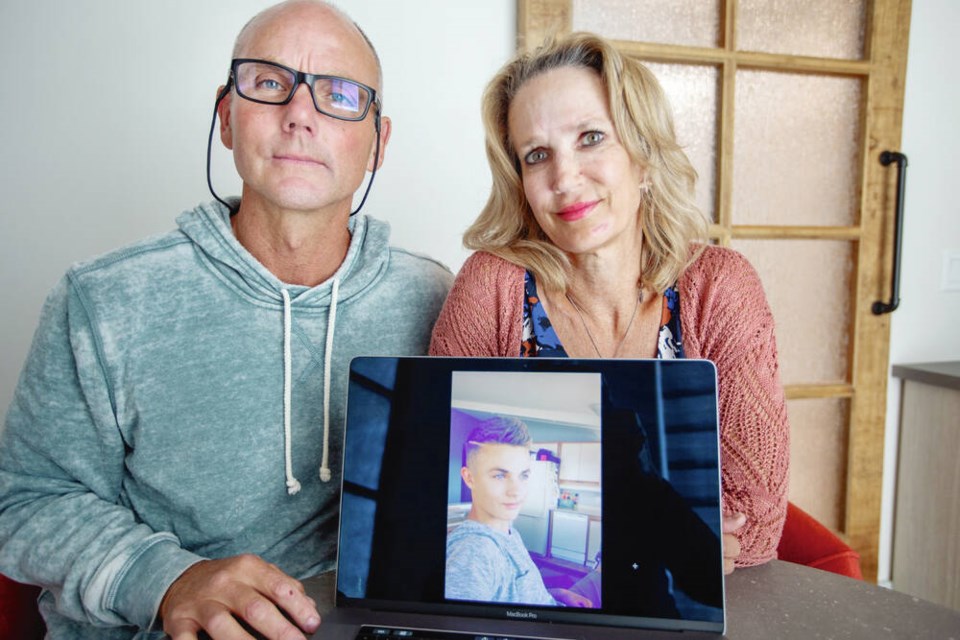A commentary by the mother of Elliot Eurchuk.
I write this letter on the fifth anniversary of the death of my 16-year-old son Elliot. He died on April 20, 2018, in his bedroom, from a toxic concoction of lethal drugs.
Elliot was first introduced to opioids by his surgeon who prescribed them while Elliot awaited surgery for a sports injury to his shoulder.
Today, we remember Elliot, not as just another of those 10,000 others who died of a drug overdose, but as our clever young soul, who made us laugh, cry and smile with pride, with admiration for his dedication to friends and family, and for the super sportsman that he was.
None of the 10,000 individuals who have died in British Columbia since 2016 are just a number. They are our sons, daughters, sisters, brothers, nurses, doctors, carpenters, our friends.
I recall the coroners’ inquest into Elliot’s death, and the six jurors who made heartfelt recommendations to the province back in June of 2019.
These recommendations were as follows:
To the Minister of Education:
• Develop processes for early detection of mental health and substance use disorders within the schools.
• Develop and implement a plan to transition youth from acute care and addiction treatment facilities to schools.
• Provide education to students. parents or guardians, teachers and administrators, on mental health and substance use disorders.
To the Ministry of Health:
• Develop and implement a plan to transition youth from health-care facilities back to community-based services.
• Streamline and co-ordinate access to available youth residential substance use disorder treatment beds and youth mental health care beds, within British Columbia.
• Provide youth with more long-term residential substance use disorder treatment facilities throughout British Columbia.
To the CEO of the Vancouver lsland Health Authority:
• Provide youth with long-term residential substance use disorder treatment facilities to be located on Vancouver Island.
To date, none of these recommendations have come to fruition. In addition to the hundreds of thousands of dollars spent by the government on the inquest process, my husband and I spent tens of thousands of our own money on a lawyer for this inquest, to ensure Elliot and his story would have a positive impact.
In doing so, we had hoped that the mistakes that were made and the massive numbers of families who have lost their children to drug overdoses would see momentum in the eradication of the stigma and shame of addiction and ensure our government took this so-called “declaration of an opioid epidemic” seriously.
What will it take for this current government, and those in our future, to take the bold but necessary steps to save lives? Do we have to wait until it’s one of their own that is lost?
I think back to when our revered premier, John Horgan, stated that drug users make a choice to take drugs and then they come to depend on those drugs.
He later apologized, stating he mischaracterized the challenges of addictions. We need to remind all of our politicians that no one chooses to become a drug addict and that anyone taking prescription or non-prescription opioids can become addicted.
We are all one accident, one surgery or one bad choice from “these challenges.”
What our government needs to do is stop looking at frivolous expenditures like the $800 million for a new museum and focus on the health and welfare of its vulnerable citizens.
We need to review policies and laws such as the Infants Care Act, which is woefully outdated, and create new ones that will allow parents to understand the mental health issues of their own children and allow them to parent.
We need housing and doctors, especially doctors who are specialized in mental health and addiction. We need a policing unit that understands the mental health challenges of those marginalized individuals.
We need a comprehensive plan to address the seriousness of the opioid epidemic that was declared seven years ago.
What we don’t need is more money spent on coroner’s inquests that take the jury’s recommendations and essentially throw them in the wastepaper basket.
Today, I remember my beautiful first-born son, Elliot, with a gaping hole in my heart, and a river of eternal tears streaming from my eyes for all of the 10,000 British Columbians who have succumbed to this disease.
>>> To comment on this article, write a letter to the editor: [email protected]



